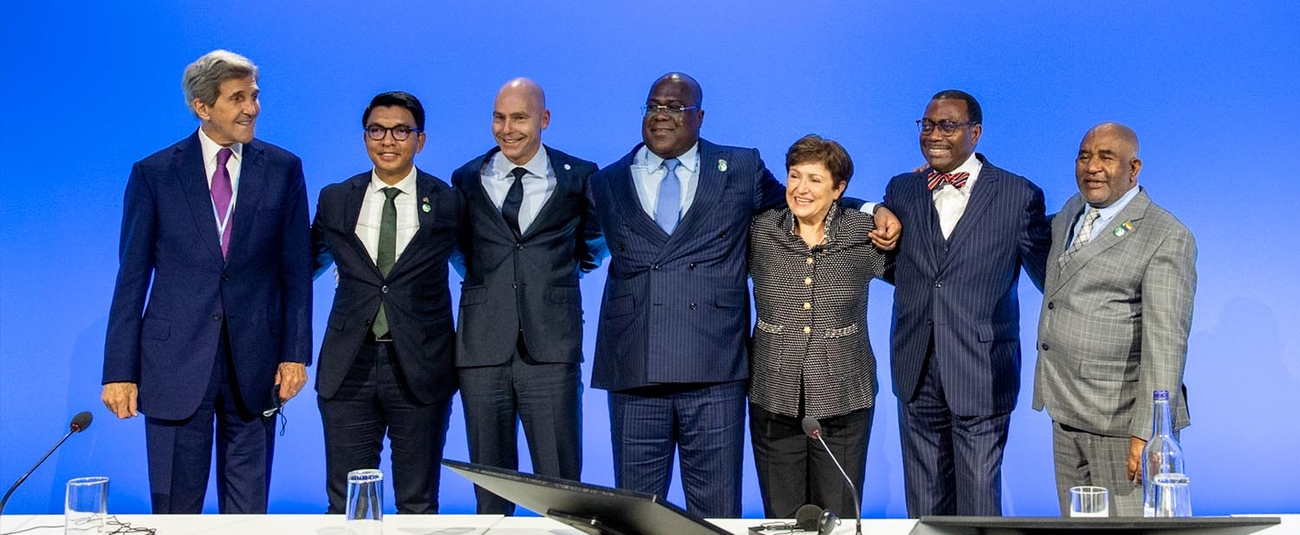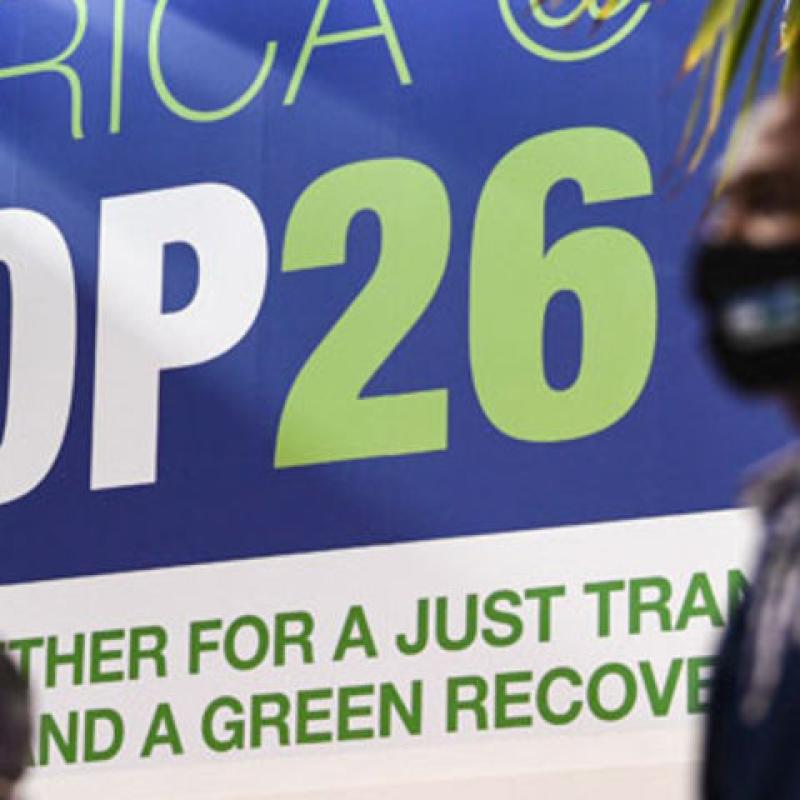
AAAP in the Media
Displaying 1 - 7 of 7
Climate risk regulation in Africa’s financial sector and related private sector initiatives
Extreme weather phenomena such as rising temperatures and the increasing frequency of droughts and floods are affecting lives and livelihoods in Africa. According to the Global Climate Risk Index 2021,1 five African countries ranked among the 10 countries most affected by extreme weather in 2019: Mozambique (first), Zimbabwe (second), Malawi (fifth), South Sudan (eighth), and Niger (ninth).
Digital Climate Adaptation Solutions Training- North Africa
Harnessing the power of technological innovations and digitalization to improve agricultural productivity and strengthen climate resilience has been recognized as one of the potential game changers to address many of pressing climate concerns and rural transformation challenges facing Africa today.
Digital climate-informed advisory services are tools and platforms that integrate climate information into agricultural decision-making. These services range from digital mobile apps, radio, and online platforms to digitally enabled printed bulletins based on climate models and extension services that utilize climate information platforms. DCAS offers crucial opportunities to build the resilience of small-scale producers in the face of worsening climate change impacts, particularly when bundled with complementary services (such as financing, input supply, market access, insurance).
The objectives of the DCAS trainings are as follows:
- Capacity enhancement for agricultural stakeholders across North Africa in DCAS
- Supporting trainees to improve their confidence and capacity to design and implement DCAS projects to reach the last mile and farmers for improved food security and climate resilience
- Facilitating knowledge/experience sharing of participants on contextual issues and approaches to scale up DCAS
- Increase the knowledge of stakeholders from across North Africa on opportunities and new approaches for the design, mainstreaming and use of digital tools and data-enabled agriculture to combat the effects of climate change
- enhancing capacity to use digital agriculture advisory services and solutions to ensure uptake by of DCAS among stakeholders in North Africa
- Over 50 Participants trained in digital agriculture and digital climate adaptation solutions
- A new cohort or platform of African public officials, researchers, farmers organizations leaders and agricultural NGO focal points with improved expertise in DCAS (for subsequent experience capitalization follow up and training)
- Training evaluation assessment report
- Improved understanding / knowledge of target stakeholders in North Africa through training and information sharing including lessons learned on the challenges, opportunities and new approaches to the design, mainstreaming and use of DCAS and data-enabled agriculture
- Enhanced capacity of selected agricultural stakeholders in public institutions and farmers groups across North Africa to use digital agriculture advisory solutions, implement digital climate smart advisory solutions, and train their members/colleagues to use DCAS tools
€100,000
Bizerte city climate stress test
Currently, Africa’s infrastructure needs are around USD 130–170 billion a year, with an investment gap of over 50–60% of that amount. Making Africa’s infrastructure resilient adds only an average of 3% to total costs, but every $1 spent could yield $4 of benefits.
The Africa Infrastructure Resilience Accelerator (Pillar 2 of the Africa Adaptation Acceleration Program (AAAP)) focuses on accelerating infrastructure resilience efforts on the continent. It will strengthen the enabling environment and provide the technical support to scale up investment in resilient infrastructure. It will also ensure that new and existing infrastructure uses nature-based solutions and create positive socioeconomic impacts and green jobs. By 2025, Pillar 2 of the AAAP aims to scale up investment at national and city level for climate-resilient infrastructure in key sectors such as water, transport, energy, and waste management, and integrate resilience in up to 50% (by value) of new infrastructure projects.
The City Adaption Accelerators (CAAs) are carrying out Rapid Climate Risk Assessments in target cities, which aim to improve climate adaptation and build resilience in urban areas.
The primary purpose of the RCRAs is to inform the identification and preparation of AfDB projects.
The RCRAs will inform the development of a comprehensive climate adaptation strategy and prioritization plan and are a crucial step towards the development of the CAA for each of the target cities. The overarching objective of the CAA is to create a shared strategic framework for GCA’s engagement in climate adaptation and resilience building in urban areas. The development objective of the CAA is to support cities and countries to strengthen their urban climate adaptation and resilience outcomes through enhanced (1) understanding; (2) planning; (3) investments; and (4) governance and capacity building.
- Outputs will inform future discussions surrounding climate adaptation investments
- GCA is demonstrating its unique value add in its ability to provide technical guidance to firms towards developing well-informed analyses
- Literature review of vulnerability and adaptive capacity assessments of cities to climate change
- Scoping of past and current initiatives and key stakeholders relevant for adaptation and resilience building in cities
- City Scan: rapid review of actions around climate hazard and risk assessments and more locally focused assessments of vulnerability and adaptive capacity
- Rapid Climate Risk Assessment: an overview of the key climate hazards and associated risks; will indicate whether an in-depth climate risk assessment is required
- City Scoping: provides insight into past and current initiatives relevant for adaptation and resilience building and identifies key stakeholders and relevant initiatives
As part of the CAA, the RCRAs will contribute to the following impacts:
- Strengthened urban climate risk management in cities and their hinterlands
- Improved climate adaptive spatial planning at the municipal and regional levels
- Enhanced water resources management for more equitable access to ecosystem benefits
- Enhanced resilience, consistency, inclusiveness and integration of urban drinking water, sanitation and solid waste management services
- Improved urban liveability and public health due to a reduction in climate risks stemming from heat stress and disease
UK gives Africa $197 million to mitigate climate change
Youth Adaptation Solutions Challenge Francophone Cohort
The Youth Adaptation Solutions Challenge is an annual competition and awards program for youth-led enterprises (50% women-led) organized by GCA and AfDB as part of the Youth Adapt Flagship Program.
The competition invites young entrepreneurs and Micro, Small and Medium-sized Enterprises in Africa to submit innovative solutions on climate adaptation and resilience. The winners will be part of a 1-year incubator program, which will provide tailored training on business development and adaptation, coaching, networking opportunities, and grants to enable the youth-led enterprises to scale up their innovative businesses and build resilience among marginalized communities in Africa
The objective of the project is to deliver business development services (BDS) to and build the institutional capacity of youth-led enterprises, positioning them to effectively utilize grants offered and to also mobilize additional private capital, scale up climate action and create employment opportunities on the continent.
- Build youth capacity for employability and unlocking access to finance
- Deliver a 1-year incubator program tailored training on business development and adaptation
- Provide coaching and networking opportunities
- Equip young innovators and MSMEs with customized skills and resources to scale up climate adaptation innovations and boost the creation of jobs
- Grant disbursement to the 5 winners of the YouthADAPT winners
- 12-weeks training with practical skills in entrepreneurship and business development and climate adaptation
- Mentorship to enable the winners to execute their business plans, create jobs, and support the continental effort towards climate resilience
- Training materials developed and training workshops delivered tailored to the selected youth-led start-ups
- Support to the youth led-businesses to develop and implement their business plans and to mainstream adaptation and climate resilience in their businesses
- Delivered business development services (BDS) to and building the institutional capacity of youth-led enterprises
- Youth-led enterprises positioned to effectively utilize grants offered and to also mobilize additional private capital
- Scaled up climate action and ability create employment opportunities on the continent
USD 500 Million
African, other world leaders gather for largest summit on climate adaptation at COP26

African and other global leaders came together at COP26 in Glasgow yesterday for the Africa Adaptation Acceleration Summit, the largest summit to date on climate adaptation.
The summit called for the rest of the world to ramp up its support for the African continent as it adapts to the adverse effects of climate change, including devastating human impacts in Madagascar, where 1.3 million people live under food distress following four years of no rain. Madagascar’s situation has been described as the first climate induced drought.
President Félix Tshisekedi of the Democratic Republic of Congo and Chairperson of the African Union led Tuesday’s event. He highlighted the $6 billion in financial commitments for climate adaptation that African countries had put forward in their nationally determined contributions (NDCs) and called for increased funding to produce the additional $27 billion a year that the continent requires.
President Tshisekedi said: “Adaptation finance flowing to Africa is grossly insufficient compared to the enormous resources needed for the continent to adapt to climate change. That is why African countries, working with the Global Center on Adaptation, the African Development Bank, and other partners, launched the Africa Adaptation Acceleration Program (AAAP). The program lies at the heart of Africa’s climate change needs. It is Africa-owned and Africa-led. African nations have endorsed it as Africa’s preferred mechanism to deploy adaptation finance for adaptation projects in Africa.”
African Development Bank Group President Dr Akinwumi A. Adesina said: “The Africa Adaptation Acceleration Program is a game changer for Africa to deliver results and impacts on adaptation, fast and at scale. It will support 30 million farmers with digital climate advisory services. The Technologies for African Agricultural Transformation program supported by the African Development Bank and the Bill and Melinda Gates Foundation has already delivered climate resilient technologies for 11.2 million farmers in just two years.”
He added: “With the Africa Adaptation Acceleration Program, we expect to reach 40 million farmers. We plan to support farmers in producing 100 million metric tons of food, which will be enough to feed 200 million people and reduce hunger by 80%.”
Moderating summit proceedings, Patrick Verkooijen, CEO of the Global Center on Adaptation, underscored the urgent need for accelerated climate adaptation action across the continent: “COP26 must deliver on the promises of Paris,” he said. “We are failing and we are failing Africa. We must bring more ambition and more finance to help Africa adapt to the pace of a climate emergency devastating the continent with increasingly serious consequences for the world’s poorest and most vulnerable,” the GCA CEO added.
COP26 President Alok Sharma announced $197 million in new funding for adaptation for Africa from the UK government. Of this amount, $27 million will support the Africa Adaptation Accelerated Program upstream facility to deliver technical assistance and a pipeline of bankable projects. The package is expected to unlock almost $1.2 billion for climate adaptation in Africa. Sharma said there will be more to come.
US Secretary of State Antony Blinken also announced new funding for climate adaptation from the United States government. He said the US President would work with the US Congress to dedicate $3 billion annually in adaptation finance by the year 2024. This is the largest commitment ever made by the US to reduce the impact of climate change in those most endangered by it around the world.

